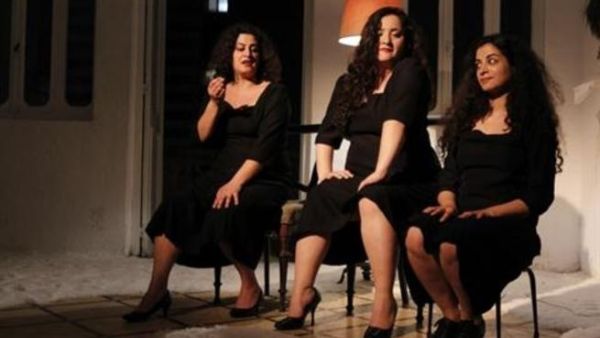Many of the greatest works of literature, art and theater owe their existence not to the imagination, but to the real-life drama of history events – their glory, but more often their horror.
Pablo Picasso’s famous painting “Guernica,” for example, was inspired by the bombing of the northern Spanish village of the same name, while several of Shakespeare’s plays were based on the lives of British rulers. Lebanese author Elias Khoury has written multiple novels on the events of the 1948 Nakba and the Lebanese Civil War.
Is it with an awareness of this that the French Institute, in conjunction with the Monnot Theater, the Sunflower Theater and Zico House, has organized “Minassa: platform for today’s Arab theater.”
The six-day event will bring together actors, writers and comedians living in countries affected by the Arab Spring, which the organizers believe is having a profound effect on regional cultural production.
“The entire history of theater is marked by events which have provoked transformations,” actor, playwright and co-founder of the Sunflower Theater Roger Assaf said at a news conference Tuesday. “These transformations are the consequence of major historical events – above all when the people participate in them.”
He points to the series of revolutions that swept through the region in the 1950s, which lead to a renaissance of theater in Egypt, Syria, Iraq and Palestine. The once-in-a-lifetime events of the Arab Spring, he says, are provoking a resurgence of creativity, as witnessed recently in Egyptian art, music, literature and, of course, theater.
“The idea is to create a platform in Beirut where we can bring together young players,” explained Aurélien Lechevallier, director of the French Institute, “as well as some older, more experienced comedians and actors. The focus is on these events which ... have shaken up our perceptions of politics and of culture in this region, and on how theatrical texts have evolved and taken these changes into account.”
The full program includes 13 plays across three venues, as well as a storytelling performance, two exhibitions, two book signings and a round table.
As well as local participants performers are traveling to Beirut from Tunisia, Egypt, Syria and Iraq. Unlike a standard conference, the participants will remain in Beirut for the duration of the program, rather than just for the day of their own performance. Each performance will be followed by an informal discussion between audience and performers, giving the public a chance to question and contribute to the event and participants a chance to interact with each other.
Monday’s program takes place at the Sunflower Theater, beginning with the opening of an exhibition by Syrian photographer Ziad Homsi. This is followed by a short film, “At the Heart of the Syrian Revolution,” directed by Raafat al-Zaqout. There will also be a performance of songs by Amal Omran, followed by “In the Shadow of the Martyr,” a Palestinian play about two brothers, one of whom commits suicide.
Tuesday’s performances take place at the Monnot Theater. The evening will begin with the opening of the event’s second exhibition, a homage to French theater director and West Bank resident François Abou Salem, who died last October in Ramallah.
This will be followed by “Beirut Sepia,” a play by local actress Chrystèle Khodr, who goes on a search for the utopian prewar Beirut which her mother remembers, but which she has never known. The night’s final performance will be “Echo” by Mohammad Habib from Egypt, about a group of men searching for the solution to a problem who all arrive independently at the same idea.
Wednesday’s venue is once again the Sunflower, and the action kicks off with authors Yakoub Chadrawi and Raymond Gebara who will be signing copies of their newly released books. The signing will be followed by a Lebanese production – “Virtuelles,” with Issam Bou Khaled and “Decibel,” a collective of deaf-mute comedians, who will share their impressions of the Arab Spring.
The final performance of the evening will be “Memory in Retreat,” by Tunisian actress and director Myriam Bousselmi. The play, which was written just before the uprisings began, likens the relationship between a dictator and the people to that of a father with Alzheimer’s and his intellectually marginalized son.
Thursday features two performances, once again held at the Monnot Theater. The first is a session of storytelling by Egyptian “hakawati” Chirine El Ansary, who will recount stories from the daily lives of her neighbors in the year since the Egyptian uprising. The second will be “Les Grenades Libertogénes,” by Ahmed Samir from Egypt – tales of the revolution’s martyrs.
Friday sees two performances at the Sunflower, “The Tahrir Monologues,” by Sondos Shabayek, a young journalist who collected over 700 testimonies from Egyptian demonstrators, and “Point Chaud” by Iraqi performer Muhannad Hadi, on the daily necessity of risking one’s life in Baghdad.
The final performance of the evening, which will take place at Zico House, is “Silk Thread” performed by a group of Lebanese actors. The play questions social structures and stereotypes, blurring the lines between fiction and reality.
“Silk Thread” will be repeated at the same venue the following night and a round table will also take place Saturday at the French Institute’s Theatre Montaigne, featuring the “Minassa” participants as well as specialist speakers, including Roger Assaf, theater specialist Robert Abirached and Paul Mattar (director of the Monnot Theater).
“Minassa: platform for today’s Arab theater” takes place at multiple locations across Beirut from Monday to Saturday. Performances are in French or Arabic with French subtitles. For more information please call the French Institute on 01-420-234 or visit http://www.institutfrancais-liban.com/fre/Beyrouth.







